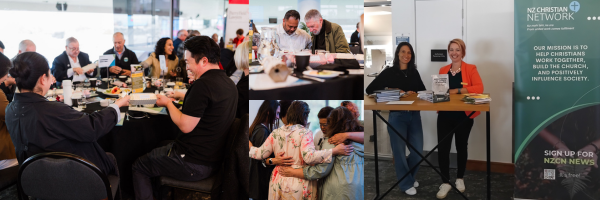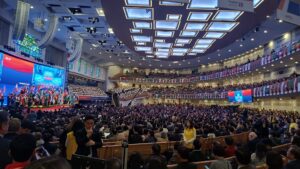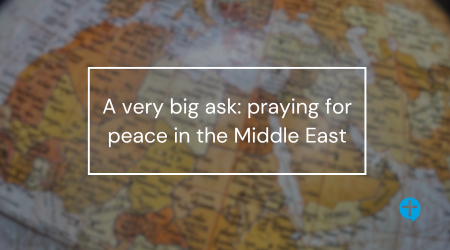
by Dr Stuart Lange | 12 Dec , 2025 | About Christianity, Articles, Christianity in New Zealand
Whatever else happens in this Christmas season (and probably too much happens), the heart of what Christians celebrate at Christmas is some utterly extraordinary, magnificent news. Good News that has the power to transform individuals, families, societies, the world.
God sent his Son…
- to come near to us: the one true and living God who made this universe sent his only Son into the world, as God with us
to reveal to humanity what God is like: “the one and only Son, who is himself God and is in closest relationship with the Father, has made him known” (John 1:18)
- to offer eternal spiritual salvation: in love, God sent his Son so that we might be reconciled with God, and receive new spiritual life both in this life and forever
- to help us become more like him: loving God with all our heart, loving and forgiving others, showing love and mercy, being inwardly transformed, and knowing the peace and blessing of God
- so that we might proclaim, live, and help extend his Kingdom throughout the whole world
Whatever our circumstances this Christmas, may the love and peace of Jesus and the presence of the Holy Spirit fill our hearts.
Meri Kirihimete and arohanui
Happy Christmas!
The NZCN Team

by Dr Malcolm Falloon | 28 Nov , 2025 | About Christianity, Articles, Christianity in New Zealand
In America, it’s Thanksgiving Weekend, a traditional time to give thanks to God for his providential care and blessings over the previous year. Interestingly, here in New Zealand we’re happy to indulge the associated Black Friday and Cyber Monday sales, but a sense of thanksgiving to God is not usually part of that.
Scientists have long known that being thankful is good for both our mental and physical health. Whatever our circumstances, if we can find aspects of our life for which we are thankful, it lifts our eyes from our present difficulties to a more hopeful future. Cicero, the Roman orator, described a thankful heart as not only the greatest virtue, but “the parent of all the other virtues”: because, by practising thankfulness, we help foster other virtues such as humility, empathy, and gain a more balanced outlook on life.
But there is something missing in all that. While most people appreciate the benefit of cultivating gratitude in their lives; fewer are aware who they should be grateful to. The question is this: if gratitude is a sense of thanksgiving and joy that comes through the receiving of a gift, who is the Gift-giver? For Christians, the answer must ultimately be God and all that he has done for us in Christ: his sustaining providence and kindness, and his grace and mercy towards us sinners.
In our increasingly godless society, many people have cut the spiritual umbilical cord tying earth to heaven. They know they should be thankful to someone (or something?). But they are no longer able to point to God. Instead of gratitude, they cultivate a sense of self-importance and entitlement, and attribute good things happening to their own efforts luck, or the stars, the “universe”, or whatever.
Thanksgiving is central to the biblical understanding of what it means to worship God and confronts our society’s spiritual blindness and lostness. The Psalms repeatedly speak of coming into God’s presence with a sacrifice of thanksgiving (Psalm 50:14, 23; 95:2;100:4; 107:22; 116:17), while the Apostle Paul’s urges the Philippian Christians not to be anxious about anything but to include thanksgiving as they make their requests known God (Philippians 4:6).
I suggest that in our society’s godless, thankless, “me first!” culture, Christians openly and publicly offering thanksgiving to God – as the Lord of heaven and earth from whom all good things come – can be a prophetic, priestly, and indeed, a subversive Christian act. If so, what should New Zealand Christians be doing that we’re not currently doing?

by Dr Stuart Lange | 18 Nov , 2025 | About Christianity, Articles, Christianity in New Zealand
New Zealand society is in a period of significant change, much of it away from Christian faith and values. More than ever, we need the Christian church to be united, healthy, and influential.
The New Zealand Christian Network (NZCN) is uniquely positioned in those areas. NZCN’s mission is to help the church in New Zealand to be more one in the Spirit, to be strengthened, and to speak constructively into NZ society with Christian grace and truth.
Some of the things NZCN does: (and see more in our Impact Report)
- Our free NZCN News, with short articles that are faithful, moderate, and clear, and information about Christian jobs, upcoming events, and member organisations
- In collaboration with regional church leaders, we run major Prayer Breakfasts
- By zoom, we regularly host Pray as One prayer gatherings
- The NZ Christian Leaders’ Congress (next one: Nov. 2026)
- Our latest, multi-author book: Strengthening the Church in Aotearoa
- A faithful, reasoned Christian voice in public media
- As necessary, participation in parliamentary select committee processes
Much of NZCN’s work is voluntary, and our very small staff team are all part-time. We remain reliant on generous financial support from donors, members, churches, and Christian trusts. The reality is, we could do so much more if we had an increased membership, were more widely known, and were much better-resourced.
Here are 7 ways you can actively support the mission of NZCN:
- Frequently uphold us in prayer!
- Subscribe (it’s free) to NZCN News
- Forward NZCN News to others, and recruit other subscribers (family, friends, colleagues, church members), to help increase our readership and impact
- Become an annual Member
- Make an online once-off donation (eligible for charitable tax rebate, CC23105)
- Set up a regular donation via direct deposit or online (tax rebate applies)
- Introduce (and recommend) NZCN to a Christian trust, large or small
Together, let’s help build spiritual unity and collaboration among Christian people and churches. Let’s help strengthen Christian faith and churches. Let’s help the light of Jesus and the Gospel to shine more brightly in Aotearoa New Zealand.

by Esther Tredoux | 3 Nov , 2025 | About Christianity, Articles, Christianity in New Zealand
On Thursday, 30 October, more than 650 Christians from around 87 churches and Christian organisations gathered to pray together at the 10th annual Auckland Prayer Breakfast.
Held at Eden Park in partnership with the Auckland Church Network and NZ Christian Network, the event was a powerful time of worship, unity, and intercession for the city of Tāmaki Makaurau Auckland.
Rev Otene Reweti opened the morning with a mihi, and worship was led by Equippers Revolution. This year’s theme, GROW, was inspired by 2 Peter 3:18, which encourages us to “grow in the grace and knowledge of our Lord and Saviour Jesus Christ.” Guided by this theme, we prayed for growth in Kingdom Multiplication, Healthy Neighbourhoods, and Christian Unity.
The Auckland Prayer Breakfast marked the conclusion of our 2025 prayer breakfast season, and we are deeply thankful to each sponsor and partner who made these gatherings possible. Throughout the year, these events have been incredible opportunities to come together in unity, seeking God’s will for our nation, churches, and families.
We look forward with anticipation to what God has in store for our 2026 prayer breakfasts!
– Esther Tredoux

by Dr Stuart Lange | 31 Oct , 2025 | About Christianity, Articles, The Church
This week 1,000 delegates from 125 nations have been meeting together in Korea, for the General Assembly of the World Evangelical Alliance, for a wonderful time of worship, fellowship, listening, discussion, and praying together. This inspiring event takes place every six years.
SaRang Church, a vibrant Korean Presbyterian church drawing over 60,000 worshippers each week, hosted the assembly in close partnership with Yoido Full Gospel Church, the Pentecostal church once led by Yonggi Cho. For the first two days the WEA Assembly was joined on site by 5,000 Korean pastors, with many shared sessions which were extraordinary for the worship, fervour, unity, and prayer.
The central theme of the General Assembly was ‘The Gospel for everyone by 2033’: encouraging a massive new worldwide emphasis on evangelism, reaching many more people for Christ in the lead-up to the 2,000 year anniversary of the birthday of the Church on the day of Pentecost, 2033.
We also heard from Christians in many nations where there is horrific persecution of Christians, and many other major problems. Many of those countries are in sub-Saharan Africa, where there is obviously a concerted and intensifying campaign of terror by Islamic groups such as Boko Haram in northern Nigeria, systematically kidnapping, killing, and destroying Christian populations. But none of this is adequately exposed by international media, or effectively combated by governments. In many countries there is also famine, political instability, deep corruption, civil war, massive displacements, and overwhelming public health crises.
In the mix of nations there were 25 people from the South Pacific region. These included people from the evangelical alliances in New Zealand (ten of us, connected with NZCN), Papua New Guinea, and Australia, and also from the emerging new evangelical alliances in Fiji, Vanuatu, Tonga, Solomon Islands, and Marshall Islands. The South Pacific region met together, with a great sense of unity.
The WEA welcomed a new General Secretary, Butros Mansour. Born and raised in Nazareth, and an Israeli citizen, Butros is an Arab Christian, and clearly a man who puts faith in Christ and the unity of believers above all else. He speaks with grace and humility, and with a global perspective, and will no doubt give good leadership.
– Stuart Lange and Malcolm Falloon



by Dr Stuart Lange | 3 Oct , 2025 | About Christianity, Articles, Christianity and Social & Moral Issues
For thousands of years, the land now known as Israel or Palestine has been a cauldron of competing ethnicities, religions, empires, and nations. It was at different times controlled by Canaanites, Philistines, Hebrews/Israelites/Judeans, Assyrians, Babylonians (from 597 B.C.), Macedonians (from 332 B.C.), Seleucids, Romans (from 63 B.C.), Arabs (from 637 A.D.), Seljuk Turks, Ottoman Turks (from 1517), and Britain (1922-1948). Although some Jews continued to live in Palestine from biblical times onwards, Arabs far outnumbered them for most of the last 1300 years. Both Israel and the local Arab population can make historical claims to have the right to live in that land.
In the 19th century, the idea developed of a Jewish re-settlement in Palestine. In 1947, mindful of the appalling horrors of the holocaust, the United Nations endorsed the establishment of restored Jewish homeland, along with a contiguous Arab state. In 1948, Jews declared the inauguration of the State of Israel. Arab nations invaded the next day. Israel prevailed, and over the next few months significantly extended its territorial reach.
The reconstituted Israel has been championed by some Jewish Zionists – and by many Christians too – as a miraculous fulfilment of biblical prophecy. Much of the Arab/Palestinian population, however, have seen the Israelis as intruders, and themselves as oppressed and dispossessed. While many ordinary Israelis and Palestinians have often done their best to co-exist peacefully, there has been continuing tension, violence, and war. As Christians, we can readily understand the prophetic aspect, and can respect that God alone knows the full picture. But as Christians, we also respect that all people should be able to live in peace and security, and with freedom and justice. The one true and living God is loving and just in all his ways, and as Christians we serve the Prince of Peace.
The war in Gaza reflects the utterly opposite viewpoints of the deeply radicalised Hamas leaders and the current Israeli government. Following the very brutal Hamas raid on Israel in October 2023 and the taking of hostages, Israel asserted its right to defend itself. Israel’s invasion of Gaza is understandable, but has led to a huge loss of life among Palestinian civilians, mass dislocations, the destruction of innumerable homes and buildings, and much distress. As in all wars, neither side is without fault, and all human beings are flawed and sinful.
Two things are sure: peace is much needed, and achieving true peace will be very, very difficult.
This week’s most recent peace proposal reflects several previous peace plans, contains many promising aspects, and includes some things that both sides may struggle to genuinely accept and implement.
For all of us, our perspectives about these matters may get some things more-or-less right, and some things wrong. At this time, though, perhaps the best thing Christians can do is not to debate our differing perspectives, but to redouble our prayer that God’s will may be done on earth, even in this very troubled and complex context where peace is undoubtedly a very big ask.













